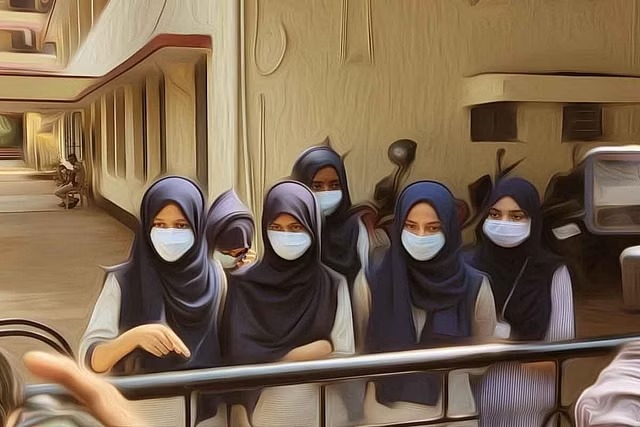By Our Correspondent
NEW DELHI – Tajikistan’s recent decision to prohibit the use of Hijab and ban ‘Idi’ for children on the two Id festivals has sparked a major controversy amid the unconvincing arguments of the Central Asian country’s government that it wants to curb public display of religion and promote Tajik culture. Significantly, 98% population in Tajikistan comprises Muslims, most of whom are the followers of Hanafi school of Sunni Islam.
The Muslim population of the tightly controlled former Soviet republic is outraged at the Parliament’s upper chamber, Majlisi Milli, approving a Bill on these two subjects. The Council on American-Islamic Relations (CAIR) and the Union of Islamic Scholars and clerics in neighbouring Afghanistan have also condemned the new legislation and termed it a severe violation of religious liberties, while asking the Tajik government to reverse the decision.
The Majlisi Milli approved the Bill on June 19 banning the Hijab, describing it as an “alien garment”, and prohibiting children’s celebrations in the form of ‘Idi’ amount given to them on the festivals of Id-ul-Fitr and Id-ul-Zuha, known locally as ‘Idgarkak’. The Bill, which was approved on May 8 by the lower chamber, Majlisi Namoyandagon, mostly targets the Hijab and other traditional items of Islamic clothing.
Hijab has come to the Central Asian nation in the recent years from the Middle East, but the authoritarian regime has associated it with Islamic extremists. The Tajik people believe that this is an ugly attack on their religious freedom and it would turn out to be counterproductive while dealing with the so-called extremists.
National Assembly’s Speaker Navruz Qurbanzoda has sought to defend the ban, saying the legislations were adopted in accordance with the procedure. Earlier, Sulaiman Davlatzoda, the head of the Religion Committee, had said at the time of the Bill’s passage in Majlisi Namoyandagon that the ban on ‘Idi’ and children’s holidays was meant for ensuring their proper education and safety during Ramzan and Id-ul-Zuha.
Tajikistan President Emomali Rahmon said after a meeting with the clergy that the “xenophobia in clothing” by wearing foreign clothes with fake names and Hijab, was a pressing issue for the Tajik society. However, the religious figures, officials, university professors and bloggers in Tajikistan have registered their protest against the latest decision. The opponents have criticised the new laws, saying that the government wants to extend its interference in their lives, pockets, and their names and surnames to the area of heir tables, graves, and wood.
Under the new law, there are penalties for offenders ranging from 7,920 somonis (Tajikistan’s currency) for individuals to 39,500 somonis for legal entities. The government officials and religious authorities are subject to significantly higher fines of 54,000 somonis to 57,600 somonis, respectively, upon conviction.
Tajikistan’s official clampdown on hijab has come this time after several years of an unofficial ban on the outfit. The country has unofficially banned bushy beards as well. In 2007, the Education Ministry banned both Islamic clothing and western-style miniskirts for students and later extended this prohibition to all public institutions.
The Tajikistan government has also launched a campaign to encourage the wearing of Tajik national dress in the recent years, as mentioned in “The Guidebook of Recommended Outfits in Tajikistan,” released in 2018. In 2017, a number of mobile phone users received messages from the government urging women to wear Tajik national attire.
The move to prohibit the Hijab has come as the latest in a series of measures by the Tajikistan government to promote a secular national identity. Late last year, the United States Commission on International Religious Freedom had stated that the Tajikistan government was committing “systematic, ongoing, and egregious violations of religious freedom” as part of an effort to maintain complete, authoritarian control over all segments of society.
Before imposing a ban on Hijab, the Tajik government has already placed undue restrictions on all facets of religious practice, including prayer, celebrations, education, and rituals. In 2022, the authorities temporarily closed all Islamic bookstores in the capital, Dushanabe, for violating the religion law. In 2023, Abdullo Rahmonzoda, the head of the Committee for Youth and Sports, suggested that bloggers should not grow beards. His reasoning was that promoting them online could be seen as sympathising with “terrorist groups” and threatening national security.
The CAIR, which is the largest Muslim civil rights and advocacy organisation in the U.S., has condemned Tajikistan’s new legislation. CAIR’s Research and Advocacy Director, Corey Saylor, expressed concern over the implications of such a law, denouncing it in a statement as a severe violation of religious liberties.
“Banning the hijab is a violation of religious freedom and such restrictions on religious attire should have no place in any nation that respects the rights of its people,” Saylor said, while laying emphasis on the organisation’s unwavering commitment to defending the rights of Muslims both domestically and internationally.
“We condemn this draconian, repressive law and urge the Tajik government to reverse this decision” the statement said. The Hijab, which covers the hair and body and is a religious commandment of the world’s fastest growing and second biggest religion, is followed by the majority of Muslim women in all countries around the world.





